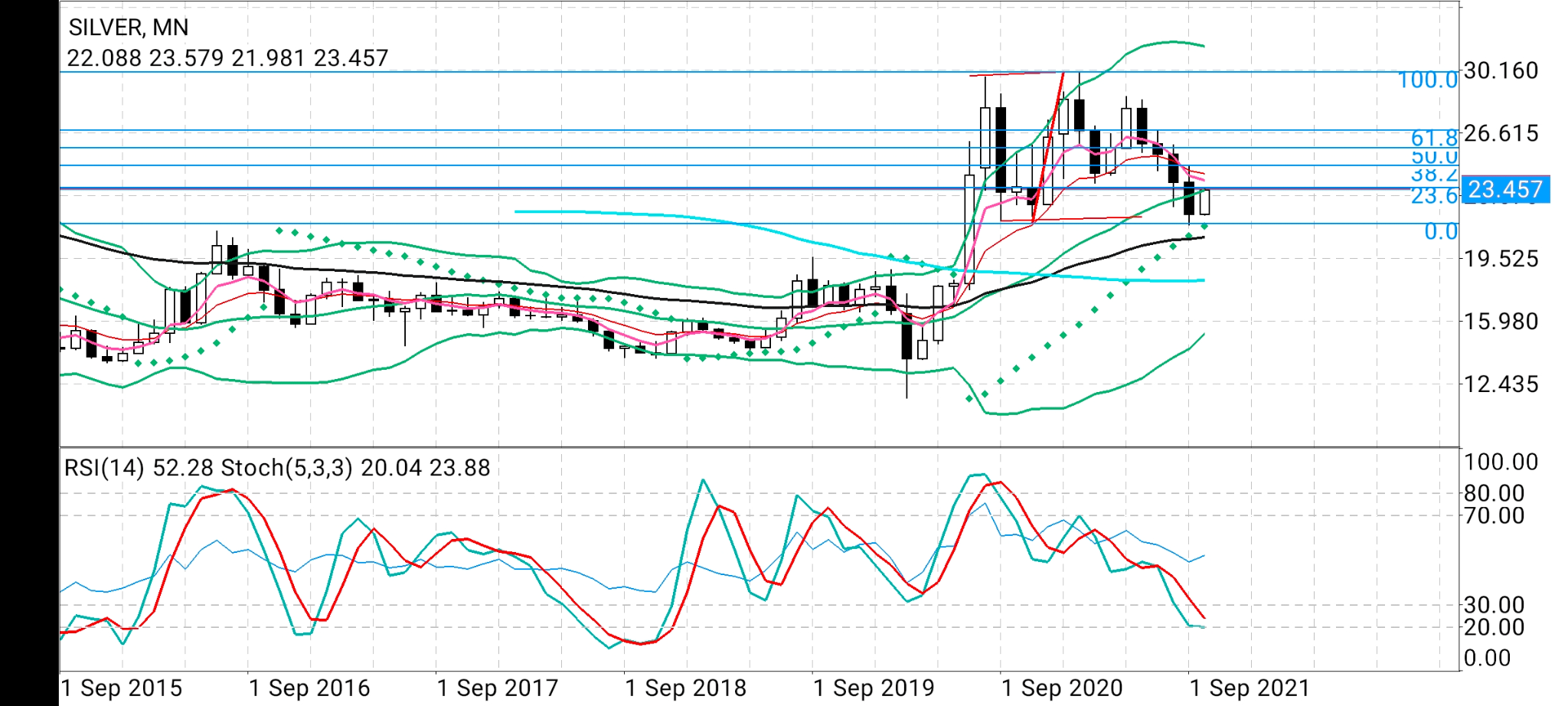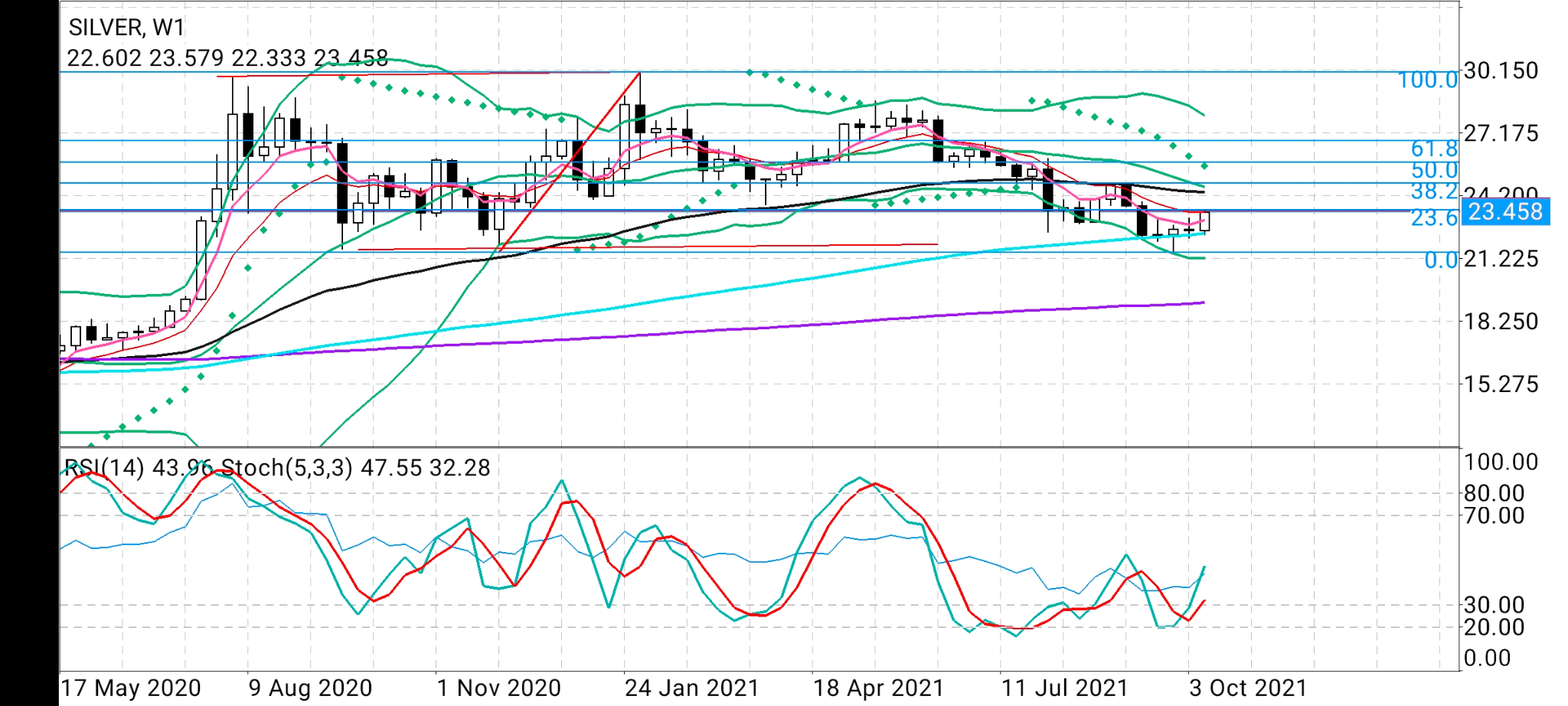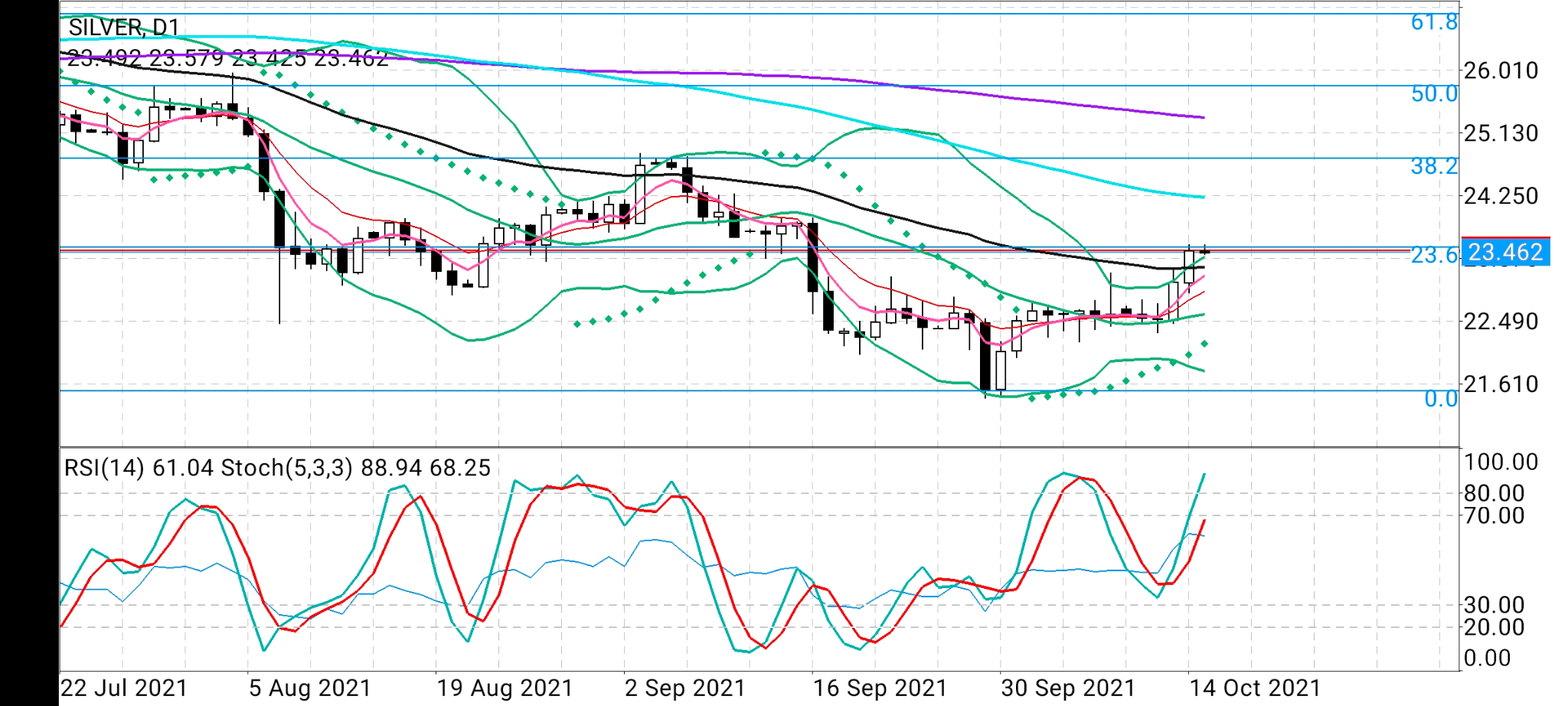After four months in the dump, the fortunes of silver have turned, with the so-called “poor man’s gold” putting on its most sparkling show since May.
The question, of course, is whether it is a fad or will it continue into a blowout.
Technicals suggest this rally has a few resistance points to clear before it fades.
Also, gold, silver’s more “illustrious cousin,” is displaying the signs of a possible breakout that have already brought it back to $1,800 an ounce, setting the stage next for north-$1,900 pricing last seen in June.

All charts courtesy of skcharting.com
Silver may have solid industrial-based fundamentals, but it has been playing second fiddle to gold in recent years, meaning a solo rally without the yellow metal seldom survives.
More than 50% of silver’s demand originates from industrial use. As a malleable metal, it is just as good as gold for jewelry making. It is also a good conductor of electricity, and used extensively in the manufacture of electronics components.
The transition to clean energy is expected to drive physical demand for silver in the coming years, particularly for connections in electric vehicles and for components within solar panels. The rollout of 5G, or fifth generation, telecom networks is also set to become a growing source of demand. But these demand factors are likely to play out in a big way for silver in the future, not right away.
For now, silver’s use across a range of industrial applications has an effect on its price—when manufacturing activity rises, the price increases due to high demand, while a fall in activity, such as during a recession, pulls the price lower.
For that reason, global monthly manufacturing PMIs, or Purchasing Managers’ Indexes, are an important gauge of silver demand, as it provides an indication of industrial activity.
The global PMI compiled by JP Morgan and IHS Markit fell to a six-month low of 54.1 in August 2021 from 55.4 in July as output growth lost momentum in several major markets (a number above 50 indicates an expansion in manufacturing activity, while a figure below that figure points to a contraction). This significantly weighed on silver in recent months.
Adding to that bearish factor has been speculation since June on when the Federal Reserve will be ready to roll back its excessively generous monthly stimulus that has carried the US economy since March 2020.
Both these clouds have cleared now, with the reading for JPM’s global PMI steadying at 54.1 in September.
The Fed also affirmed this week via the published minutes of its policy-making committee’s meeting in September that the start of its stimulus taper would likely begin in November or December and conclude by the middle of next year.
The central bank suggested a roll back of $15 billion that would end, in eight months, the $120 billion it was spending every month to buy bonds and other assets to support the economy amid the COVID-19 crisis.
The Fed announcement brought clarity and assurance to investors that the pullback in monetary support will be gradual. More importantly, the Fed stressed that it was not in any rush to hike interest rates held at between zero and 0.25% since the start of the pandemic.
With these risk-supportive elements in place, the spot gold price sprung from the mid-$1,700 levels to $1,800 on Thursday.
Spot silver climbed to $23.63 an ounce, its highest since around mid-September. For October thus far, it is up 5.7%, its biggest advance since May’s 8.3%. It lost a cumulative 21% between June and September.

Silver’s next target would be to close in on the $24.80 level it has been circling for a while, said Sunil Kumar Dixit, chief technical strategist at skcharting.com. Dixit explanined:
“Silver’s monthly chart reflects an intriguing medley of hope and despair, with prices confined within the support level of $21 and the 38.2% fibonacci level at $24.80 for quite some time.”
On a mid term perspective, the weekly chart showed a confluence zone consisting of the 50-Exponential Moving Average of $24.30, the middle Bollinger Band of $24.60 and the 38.2% Fibonacci level of $24.80, said Dixit.
“The metal has been trading above 100-week Simple Moving Average of $22.42 and further advances may aim to test all the confluence levels,” he added.

But Dixit also warns that if silver’s bullish run ends prematurely, it could collapse below $20.
“Given the uncanny and indecisive volatility, chances of reverse gear from the confluence zone can hardly be ruled out,” he said, adding that rejection from the $24.30-$24.80 areas could bring silver to immediate support at the 100-week SMA of $22.40 that extend to the 200-week SMA of $19.20.
He said a slump in gold could also be a trigger for selling gold.
“Gold, however, has been looking optimistic above the 100-week SMA of $1765 and gained support for the 50-week EMA of $1790 to successfully test $1,800,” said Dixit.
“Nonetheless, unless gold is allowed to close above $1,800 in the coming sessions, and more importantly above $1,835, bears are very poised to sell the rallies.”
As always, the trend is your friend, but do temper your trades with moderation.
Happy weekend to all!
Disclaimer: Barani Krishnan uses a range of views outside his own to bring diversity to his analysis of any market. For neutrality, he sometimes presents contrarian views and market variables. He does not hold a position in the commodities and securities he writes about.
